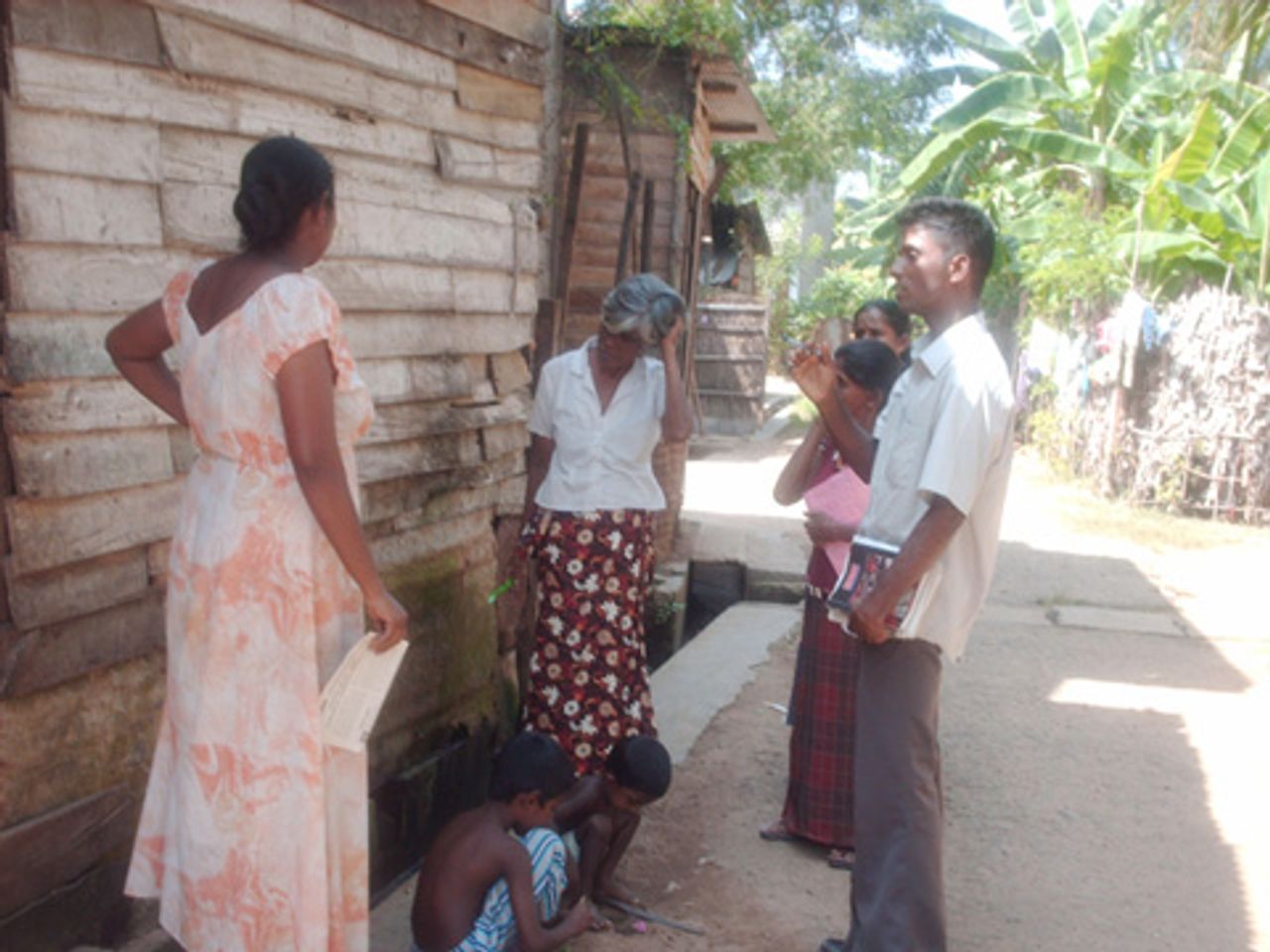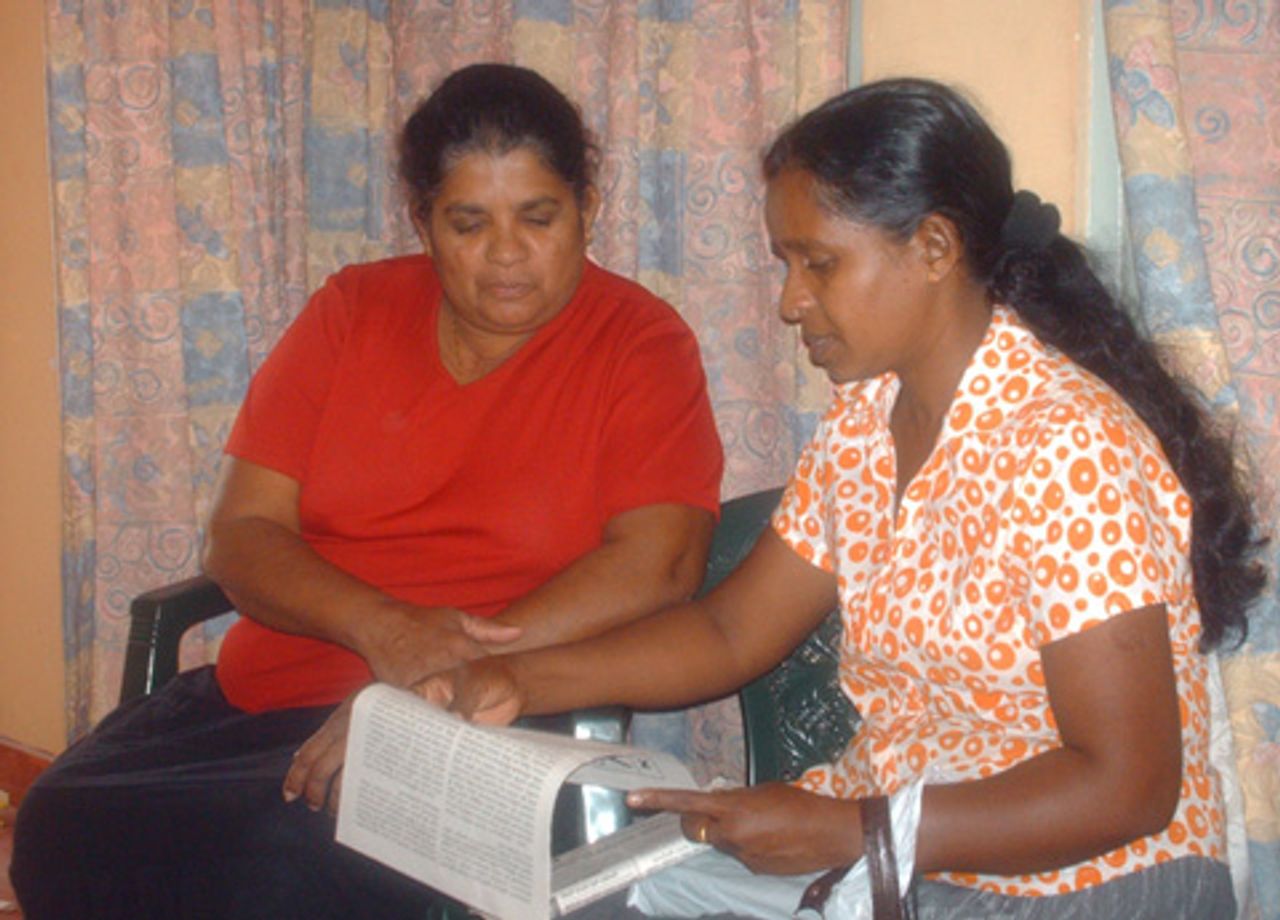As part of the Socialist Equality Party’s campaign for Wije Dias, its candidate for the January 26 presidential election, SEP members visited the southern coastal town of Matara and its suburbs, 160 km from Colombo. SEP campaigners distributed thousands of copies of the party’s election manifesto and held discussions with hundreds of people, including workers, youths, housewives, farmers and students.
Matara was once known as a left-wing stronghold. The sole remaining Stalinist Communist Party of Sri Lanka (CP) elected member of parliament, Chandrasiri Gajadheera, is from this area. He is a deputy minister of President Rajapakse’s ruling Sri Lanka Freedom Party (SLFP)-led coalition.
 SEP campaign in Matara
SEP campaign in MataraThe Lanka Sama Samaja Party (LSSP), which betrayed the principles of Trotskyism when it joined an SLFP-led government in 1964, had several strong branches in the area. Its previous fight for socialism and internationalism against imperialism and Stalinism is still remembered by the older generation.
Divakara, 70, from Welegoda, a Matara suburb, said his father was a dedicated “Samasamajist” (LSSP member). “I recall how he and his colleagues argued with CP members against the stand taken by the CP in the parliamentary election of 1956.” In that election, the CP supported the Mahajana Eksath Peramuna of S.W.R.D. Bandaranaike and Philip Gunawardena, which was based on Sinhala communalism. “My father used to say that this betrayal directly helped the imposition of the Sinhala-only language policy.”
Divakara’s father was highly disappointed by the path taken by LSSP from the late 1950s. He was disgusted when the SLFP coalition government, which had been joined by both the CP and LSSP, introduced the 1972 constitution that established Buddhism as the state religion. Colvin R. de Silva, a LSSP leader, drafted the constitution. “My father said that Colvin R. de Silva had taught them that religion must be separated from the state as a democratic principle.”
Divakara added that in his childhood he was also inspired by the LSSP’s politics but had gradually distanced himself from socialism. “However, it is glad to hear that your candidate Wije Dias is fighting for the great principles for which my father and their generation fought,” he said.
In the Nupewela tsunami housing scheme, SEP campaigners met Ramya, a housewife, whose family was one of tens of thousands whose lives were devastated by the December 2004 Asian tsunami.
Ramya said both major candidates—Rajapakse and the opposition’s General Sarath Fonseka—were fighting to take the credit for the war victory over the separatist Liberation Tigers of Tamil Eelam (LTTE). “We thought that we could have a better life after the war ended. Months have passed but the situation is worsening. We don’t believe any party. They all come to us with false promises.”
 Ramya (left) discusses election manifesto with SEP member in Matara
Ramya (left) discusses election manifesto with SEP member in MataraRamya’s family lost everything, including their home, in the tsunami. Her husband, a fisherman, lost one of his legs. He now works as a fish stall helper for 300 rupees (less than $US3) a day. The family lives in a government-supplied house.
“This house is not enough for us,” Ramya said. “And we don’t own the house, so we face many problems, particularly over the school admissions of our children.” Residents of the housing scheme had gone to meet minister Gajadheera several times but he had never shown up. “Now he asks for our votes for his boss Rajapakse. Why should we? They gave us only misery,” she said.
“We don’t vote for anyone. No one talks about us. The Janatha Vimukthi Peramuna (JVP—a Sinhala chauvinist party) boasts about our problems but every time they join one of the main parties, forgetting our problems.”
Ramya said some residents had decided to vote for Fonseka to express their anger. “At the same time, they don’t believe Fonseka’s false promises either.”
With the prices of essential commodities skyrocketting, Ramya said many could not bear the situation. Some people did not eat three meals a day. “We spend 10,000–12,000 rupees for our meals in one month. We cannot save even a little money for medicine. We can’t rely on public health service because there are no medicines in the hospitals.”
Another housewife commented: “Most of our husbands are fishermen. They cannot fish during five to six off-season months. We have to pay many bills—50 rupees for the water motor, 12 rupees for common tube lights, more than 500 rupees for home electricity. Our water bill is about 250 rupees. In the fishing season we can somehow manage, but in the off-season we mortgage our jewellery in order to live.”
Another Nupewela resident, Oshani, 24, described the manoeuvres of minister Gajadheera. Her husband, who has advanced level education qualifications, worked for Gajadheera in the last election, expecting help to find a job. “But Gajadheera gave my husband only four false interviews. Later he went abroad for a job.”
Asked about the election, Oshani said: “The president called an early election because people were losing faith day by day. Sarath Fonseka and Mahinda Rajapakse waged the war but others died. The families of the soldiers who died and who lost their limbs are still suffering.”
Oshani noted that the media and the government had hidden the death toll and immense sufferings of the Tamil masses. “As you said, the unity among Sinhala and Tamil people was massively harmed by the war,” she concluded.
Another tsunami victim, the wife of a railway worker, complained about a recent major cut to her husband’s pay. “Since November, the allowance given to railway security workers was cut by the government by 7,000 rupees per month. My husband only drew 30,000 rupees, including that allowance. We have fallen from the pan into the fire since the war.”
